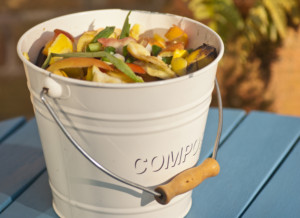The Smart Person’s Guide to Effortless Composting
Whether you have a large, or like me a small, garden space, composting is essential for keeping it well managed and abundant, as it gives a plentiful supply of mulch which tempers the extremes of temperature, prevents weed growth and provides valuable nutrients for plant growth.
Making compost can be as simple or as complex as you want to make it, and it does not have to take any more effort than bagging up your garden waste. The work involved is not difficult. When done properly there need not be any untidiness or nasty smells, composting can become as natural as mowing your lawn, or any other regular gardening activity.
Making Your Own Composting Area
You could simply make do with a simple collection of compostable garden materials like grass cuttings and leaves scraped together into a heap in a corner of your garden.This however may become untidy and difficult to work with particularly in a small area. Some form of containment will be needed.This can be something you can effectively put together out of recycled wood or old wooden pallets.
Whatever you use need not involve much cost – free materials can often be readily found – if you are handy at do-it-yourself.
Readymade Compost Bins
Many of us may not have the time or the inclination to make our own bin.This need not be a much more expensive option to a DIY version.A well designed readymade compost bin is compact and can also enhance your garden as an attractive feature particularly if it is integrated with a planter. There are many types of bin with planter available to buy
Top Tips for Good Composting
1.Placing your composting area
Whether you build or buy a compost bin it is important to put it on level well drained ground where the worms can get in and work their magic breaking down the content
2.Not all your waste content is suitable
Good things to compost include vegetable peelings, fruit waste, teabags, plant and grass cuttings.You can also include: crushed egg shells and cardboard egg boxes, old crushed-up newspaper and garden leaves.
Bad things for your bin are: meat, dairy products, cat litter and dog waste, perennial weeds or weeds with seed heads.Of course, glass, metal snd plastics should be disposed of separately in local recycling.
3.Getting the balance of content right
For a good quality compost the mix needs to be right.If the content is too wet it needs more green material.If it is too dry then more ‘browns’ need to be added.The whole should be turned regularly so that air gets into the mix.This need not be heavy work but it will help speed-up the process of decomposition.As an aid to this pockets of air can be created with the addition of bits of cardboard and scrunched up newspaper, but not too much as this material takes much longer to break down.
4.For faster composting
In addition to a good mix and regular turning a compost activator can be used to accelerate the process significantly cutting the time it takes to make good compost.
5.And there you have it!
The finished product will be a crumbly dark brown soil-like layer.When you spread the compost generously on your garden beds rich nutrients will be added to the soil and will protect it from extremes of temperature and help prevent weed growth.
Happy gardening now!


